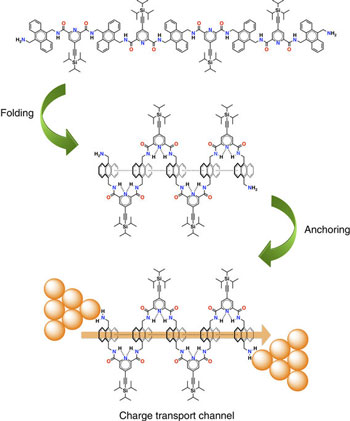| Posted: Jun 07, 2017 |
Novel suite of nanowires opens up new horizons in nanoelectronics
(Nanowerk News) The current demand for small-sized electronic devices is calling for fresh approaches in their design.
|
|
A group of researchers at the Basque Excellence Research Center into Polymers (POLYMAT), the University of the Basque Country (UPV/EHU), the University of Barcelona, the Institute of Bioengineering of Barcelona (IBEC), and the University of Aveiro, and led by Aurelio Mateo-Alonso, the Ikerbasque research professor at POLYMAT, have developed a new suite of molecular wires or nanowires that are opening up new horizons in nanoelectronics.
|
|
The research is being published today in the prestigious journal Nature Communications ("High conductance values in π-folded molecular junctions").
|
 |
| Schematic representation of the folding and anchoring processes needed to obtain π-folded molecular junctions from a representative member of the foldamer family studied in this work. (© Nature) (click on image to enlarge)
|
|
The growing demand for increasingly smaller electronic devices is prompting the need to produce circuits whose components are also as small as possible, and this is calling for fresh approaches in their design.
|
|
Molecular electronics has sparked great interest because the manufacture of electronic circuits using molecules would entail a reduction in their size.
|
|
Nanowires are conducting wires on a molecular scale that carry the current inside these circuits. That is why the efficiency of these wires is crucially important.
|
|
In fact, one of the main novelties in this new suite of nanowires developed by the group led by Aurelio Mateo lies in their high efficiency, which constitutes a step forward in miniaturizing electronic circuits.
|

